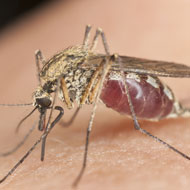Collaboration needed to fight zoonotic disease, experts warn

New research suggests that populations of disease-carrying insects are on the rise.
An urgent call for greater collaboration between animal and human health sectors to tackle emerging exotic diseases has been issued by the global animals medicines association.
The organisation warns that further infectious diseases like the Zika virus “could be on the horizon if crucial steps are not taken”.
The announcement comes as new research suggests that populations of disease-carrying insects are on the rise.
Commenting on the worrying global trend, Carel du Marchie Sarvaas, executive director of HealthforAnimals, said: “The devastating potential of emerging and existing, infectious diseases is of serious concern for global public health.
“As reported by OIE, 75 per cent of emerging diseases are zoonotic, which affect human and animal health alike, so there is urgent need for greater collaboration between the two health sectors. It is likely that many zoonotic and vector-borne diseases will become more widespread in the near future.”
There are currently over 200 identified zoonotic diseases, such as Ebola, the most deadly 13 of which are responsible for 2.2 million human deaths each year.
In a recent report, global health experts outline changes they feel are urgently required in order to effectively fight the growing problem of zoonotic disease.
One key insight from this report was a call for greater collaboration between the animal and human health sectors.
Mr du Marchie Sarvaas added: “The conclusions of the report remain optimistic. The previous response to emergency situations testifies to the healthcare sector’s capability to overcome barriers to collaboration when the situation demands.
“In order to best prepare for the future, we need to enable and encourage collaborative efforts between organisations and governments, and most importantly between the animal and human health industries.”
“Local authorities, farmers and health workers need to be involved in putting in place strategies to manage interactions between human, animal and environmental health issues.”



 The veterinary mental health charity Vetlife is inviting the veterinary community to join it for a sponsored cold-water dip.
The veterinary mental health charity Vetlife is inviting the veterinary community to join it for a sponsored cold-water dip.